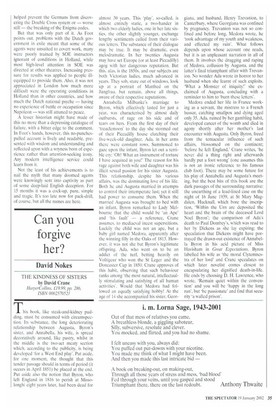Mission not accomplished
Alan Judd
SOE IN THE LOW COUNTRIES by M. R. D. Foot St Ennin's Press, £25, pp. 553, ISBN 190360804X In the second world war the Special Operations Executive (SOE) was established by Churchill with the task of wreaking sabotage and fostering subversion in occupied Europe. In fact, its scale of operations was world-wide and it was famed particularly for its achievements in the Balkans, Norway, France and parts of the Mediterranean. Less widely known, though always acknowledged by historians, were its grim and costly failures during one period of the war in Holland and Belgium. M. R. D. Foot, doyen of second world war
intelligence historians and famed for his ground-breaking SOE in France, had full access to surviving official papers for this hook. The result is the best account there has been, or is likely to be.
Foot deals mainly with Holland, where the failure was more catastrophic. He is uniquely qualified to judge his subject, not only because of his earlier researches but because of his personal links with Holland and the fact that he experienced undercover service in occupied Europe with the SAS, learning at first hand the realities of capture (he was one of only six out of 100 SAS captives to survive in 1944/5). This gives him more insight than most historians into the detail and psychology of operational failure, and more understanding of how it can come about.
The first SOE agent sent to Holland never arrived; there was nothing sinister in this, but it was an ominous sign of worse to come. Two more reliable agents who followed later were betrayed to the Germans by a stool pigeon, thus beginning what the Abwehr, the German secret service, called their Englandspier , And very good play they made of it; from this small beginning, they went on to capture over 50 agents, turning some, executing others, and taking secret control of 18 wireless transmitters. Thus, on a smaller scale but no less effec
tively, they were operating the mirror image of the British Double Cross system, under which every German agent sent to Britain was eventually caught and either killed or turned. On both sides, the counter-espionage authorities were in full control of the enemy's agent operations, directing what they did, what they reported, where the next would land and so on. You can't expect better — or worse — than that.
The difference between the two achievements was that the British were more imaginative in exploiting theirs — as in the deception operations, for example, which saved thousands of lives during the Normandy invasion — and that the Germans never discovered it. The Englandspiel', on the other hand, lasted for about 15 months, by the end of which enough warning bells had rung in London for the plug to be pulled.
They should have been heeded much earlier, of course. The signs were there: danger signals included in transmissions, safety signals omitted, suspicious locations, convenient coincidences and, crucially, an agent who escaped capture and warned of the fates of others. That these signals were not heeded was due in part to human weakness, the desire to believe anything but the worst case. The same tendency helped prevent the Germans from discovering the Double Cross system or — worse still — the breaking of the Enigma codes.
But that was only part of it. As Foot points out. problems with the Dutch government in exile meant that some of the agents were unsuited to covert work, many were poorly trained by SOE instructors ignorant of conditions in Holland, while most high-level attention in SOE was directed at other theatres. Increasing pressure for results was applied to people illequipped to provide them. Also, it was not appreciated in London how much more difficult were the operating conditions in Holland than in other countries, and how much the Dutch national psyche — having no experience of battle or occupation since Napoleon — was still attuned to peace.
A lesser historian might have made of this no more than a depressing catalogue of failure, with a bitter edge to the comment. In Foot's hands, however, this no-punchespulled account is lively and readable, presented with wisdom and understanding and reflected upon with a wryness born of experience rather than attention-seeking irony. Any modern intelligence service could learn from it.
Not the least of his achievements is to nail the myth that many doomed agents were knowingly sent into captivity as part of some deep-laid English deception. For 15 months it was a cock-up, pure, simple and tragic. It's too late now for pack-drill, of course, but all the names are here.































































 Previous page
Previous page